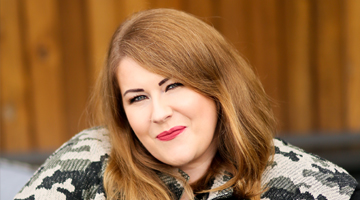Why did you sign up to become Chartered with the CIPR?
Every year I set myself goals, I enjoy learning. CPD, upskilling and training is always on our agenda at RNN Comms, and over the past few years, I’ve actually enjoyed the CPD process with the CIPR, rather than viewing it as a ‘must do’.
In January, when thinking about the year ahead, I signed up for the Chartered assessment date in April, due to take place in Edinburgh, as once it’s in the diary, I know it’ll be done.
How did you know you were ready for it?
I’m a senior communicator with confidence in my abilities and when I set my mind to something, I generally achieve it. However, if you are unsure, there’s a very detailed document on the CIPR website which you can benchmark your abilities, knowledge and experience against. I met most of the criteria, but in some elements lacked experience. I treated these areas as the ones to prioritise in my prep, not only because I had to, but I also viewed this as an opportunity to really hone in on these areas and expand my knowledge base.
How did you prepare?
A couple of weeks before the date, I really focused my attention on the information document, identifying the key areas - ethics, leadership, measurement and crisis comms. I allocated time slots in my diary for study, and read articles on the CIPR website, listened to various podcasts, tapped into thought-leadership articles, and refreshed my mind on some of the fundamentals etc.
A preparation document outlining how the day would be structured, detailing the areas of focus and questions was issued around two weeks before the assessment day. I took the time to read each of the reference point articles, filter these through my learning and thinking, and also applied relevant examples and experience to each of the questions.
Finally, as our assessment was due to take place in the midst of the unfolding pandemic, I drilled down into how we, as an agency, have been navigating this period on behalf of our clients and how other companies and brands have been performing in relation to their comms.
How did the day go, especially with it being the first virtual Chartered Assessment?
From the outset, the advice I received from those already Chartered PR practitioners was to speak up. The virtual nature of the day actually facilitated this for all as we each had allocated time slots when we had to specifically address the questions.
Instead of hoping to be heard, the spotlight was firmly on each of us as we addressed the assessor individually. Sure, online, you miss out on those non verbal nuisances - the ability to use body language to agree with someone, encourage them, gesture that you’d like to speak - however I felt that this was outweighed by ensuring that every person received an equal share of the mic and had an ability to demonstrate their thinking.
In addition, the virtual nature of the assessment saved on travel time, flights, accommodation etc. so was a much more efficient way of completing this assessment.
Any tips for those thinking of signing up?
Are you ready? Do you feel ready? If so, download the Chartered information booklet on the CIPR website which will clearly outline the skills that the assessment is measured on. If you’re not there yet, get experience in these areas and use the time ahead to become much more involved with these issues within your organisation or agency.
If you feel that this is within reach, go for it! Learn, read, soak up all of the huge banks of information that are now available online.The questions sent pre-assessment are a guideline. I found that one of our assessors followed the set format, whereas the other, used the sample questions as the basis for discussion so don’t be surprised if the approach is slightly different.
Plus, have your own examples. My entire career has been spent in agency, working mostly in the consumer arena. My experiences were quite different to those from the public sector, from in-house roles and from the various regions etc. That’s OK! I found that my fellow delegates wanted to hear all about my experiences, and likewise, I really enjoyed hearing about the differences, and similarities, that all comms professionals face.
(Side note: I also stalked my assessors’ social profiles to see if I could identify any particular areas of interest and also read many more pieces from the authors of the three specific articles that were referenced in the proposed questions document.)
How do you believe being Chartered will benefit your career?
We are professional communicators. We’re most effective when at the Boardroom table, working in partnership with clients to help achieve their organisational objectives. Chartered status cements our professionalism and commitment to ongoing learning and development. It demonstrates the strength of our knowledge and also clearly aligns our practice to the CIPR’s Code of Conduct.
The Chartered status lends authority to my guidance and I’m hopeful that this is the first step in a journey for everyone at RNN Comms to have an even greater focus on CPD, with the overall goal of Chartered accreditation for all senior members of the team.
To chat to Riki or find out more about RNN Communications visit www.rnncommunications.com or check out
@RNNComms |
@RikiNeill on social
